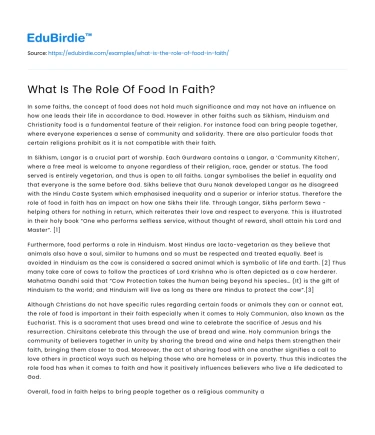In some faiths, the concept of food does not hold much significance and may not have an influence on how one leads their life in accordance to God. However in other faiths such as Sikhism, Hinduism and Christianity food is a fundamental feature of their religion. For instance food can bring people together, where everyone experiences a sense of community and solidarity. There are also particular foods that certain religions prohibit as it is not compatible with their faith.
In Sikhism, Langar is a crucial part of worship. Each Gurdwara contains a Langar, a ‘Community Kitchen’, where a free meal is welcome to anyone regardless of their religion, race, gender or status. The food served is entirely vegetarian, and thus is open to all faiths. Langar symbolises the belief in equality and that everyone is the same before God. Sikhs believe that Guru Nanak developed Langar as he disagreed with the Hindu Caste System which emphasised inequality and a superior or inferior status. Therefore the role of food in faith has an impact on how one Sikhs their life. Through Langar, Sikhs perform Sewa - helping others for nothing in return, which reiterates their love and respect to everyone. This is illustrated in their holy book “One who performs selfless service, without thought of reward, shall attain his Lord and Master”. [1]
Save your time!
We can take care of your essay
- Proper editing and formatting
- Free revision, title page, and bibliography
- Flexible prices and money-back guarantee
Furthermore, food performs a role in Hinduism. Most Hindus are lacto-vegetarian as they believe that animals also have a soul, similar to humans and so must be respected and treated equally. Beef is avoided in Hinduism as the cow is considered a sacred animal which is symbolic of life and Earth. [2] Thus many take care of cows to follow the practices of Lord Krishna who is often depicted as a cow herderer. Mahatma Gandhi said that “Cow Protection takes the human being beyond his species… (It) is the gift of Hinduism to the world; and Hinduism will live as long as there are Hindus to protect the cow”.[3]
Although Christians do not have specific rules regarding certain foods or animals they can or cannot eat, the role of food is important in their faith especially when it comes to Holy Communion, also known as the Eucharist. This is a sacrament that uses bread and wine to celebrate the sacrifice of Jesus and his resurrection. Chirsitans celebrate this through the use of bread and wine. Holy communion brings the community of believers together in unity by sharing the bread and wine and helps them strengthen their faith, bringing them closer to God. Moreover, the act of sharing food with one another signifies a call to love others in practical ways such as helping those who are homeless or in poverty. Thus this indicates the role food has when it comes to faith and how it positively influences believers who live a life dedicated to God.
Overall, food in faith helps to bring people together as a religious community and consolidates their relationship with God.
Did you like this example?
Make sure you submit a unique essay
Our writers will provide you with an essay sample written from scratch: any topic, any deadline, any instructions.
Cite this paper
-
APA
-
MLA
-
Harvard
-
Vancouver
What Is The Role Of Food In Faith?
(2022, February 17). Edubirdie. Retrieved December 18, 2024, from https://edubirdie.com/examples/what-is-the-role-of-food-in-faith/
“What Is The Role Of Food In Faith?” Edubirdie, 17 Feb. 2022, edubirdie.com/examples/what-is-the-role-of-food-in-faith/
What Is The Role Of Food In Faith? [online].
Available at: <https://edubirdie.com/examples/what-is-the-role-of-food-in-faith/> [Accessed 18 Dec. 2024].
What Is The Role Of Food In Faith? [Internet] Edubirdie.
2022 Feb 17 [cited 2024 Dec 18].
Available from: https://edubirdie.com/examples/what-is-the-role-of-food-in-faith/
copy






 Stuck on your essay?
Stuck on your essay?

